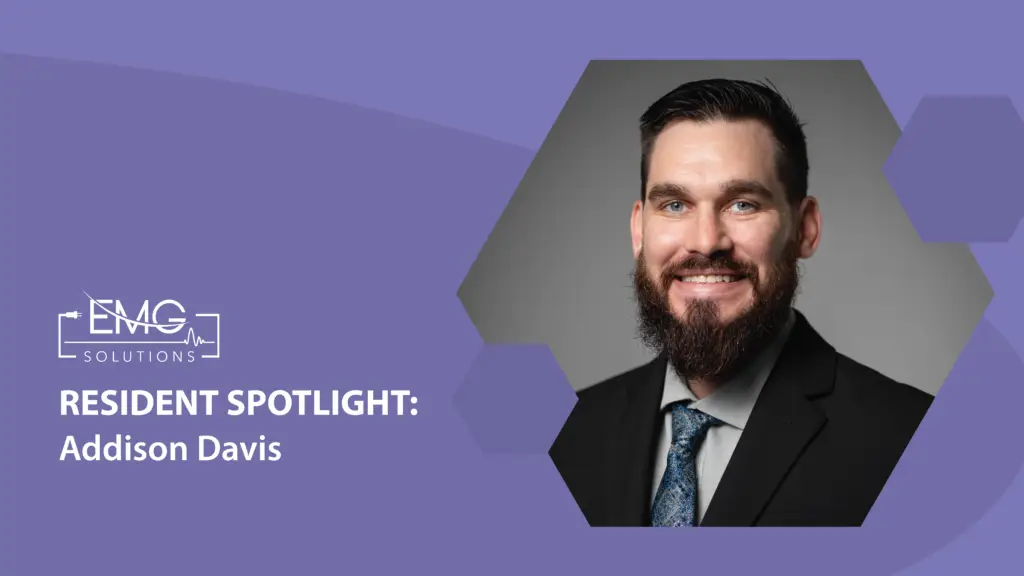- Where did you receive your DPT degree and what led you to the PT profession?
I graduated from South College with my DPT. My path to becoming a PT was quite a windy road. I began undergrad thinking I wanted to be an en- gineer to make prosthetics. At the same time, I was in a band that was doing well so I did the only logical thing a 19-year-old can do and tanked my grades so I couldn’t return in the fall. The band was great until I realized that all the other bands I thought had “made it” were also eating Taco Bell for every meal. I ended up working at a Starbucks barely affording rent and living off end of day leftover pastries. My dad met with me, knowing that I was strug- gling and thought it might be best if I moved from Wisconsin to Tennessee to live with my grandfather and work in a factory until I get my feet back under me. I ended up making truck tires for about 5 years and met my amazing wife at that time. I happened to run in a Wounded Warrior Race and there was a veteran with bilateral lower extremity prosthetics. It sparked the part of my brain that was interested in helping people and getting them back to being active. I ended up taking classes at a community college with many long nights getting my grades up. I was able to transfer and move to UT- Chattanooga and finished my bachelor’s there. The rest is history.
- When did you first learn about clinical electrophysiology offered as a specialty for Physical Therapists?
After practicing as an acute care PT through the pandemic I found myself looking for a way to continue learning and growing within the profession. I was doing research on the APTA website regarding specialization and came across clinical electrophysiology at that time.
- At what point did you become interested in EMG and NCSs?
I have always enjoyed trying to find answers to issues patients have that they have not been able to reach a meaningful conclusion that would lead to them getting relief. While shadowing Randy Hulet, I realized fairly quickly that there were patients getting answers to questions that had plagued them for months or even years.
- What made you decide to go the Residency route vs. independently com- pleting study and earning mentor hours?
The thought of attempting to tackle this on my own without expert guidance through residency seemed to be a huge task that I don’t think I was prepared for. Also, hearing about the way that the team at EMG Solutions will bounce ideas off of each other on a day to day basis really made me convinced this was the place for me.
- What have you loved most about the residency?
As I mentioned earlier, I really enjoy getting the answers to questions that patient’s have when they haven’t been able to figure out why they are having pain or numbness. Additionally, if we are being honest, this isn’t always the most comfortable test to have done. I really enjoy getting to the end of a test and having the patient feel like the test was better than they had imagined or even heard from their friends.
- Is there anything you have disliked about the residency?
There is a fair amount of travel which can be hard. Also, like any
healthcare practice the documentation can be daunting at times. Documenta- tion gets better as you get more reps, but initially it can be pretty scary.
- What is the most interesting case you have tested and what did you learn?
There have been a few cases of long thoracic nerve injuries with winging present. It was neat to be able to put data into something I would see from time to time in traditional practice.
- What are words of advice you would like to share with potential or future residents?
Shadowing can be a great way to connect with the team and see what we do. I’d highly recommend that.
- Has the residency met your expectations? How?
Yes, it’s been great to work with multiple mentors and get different perspectives on cases that we see.
- Is there anything else you would like to share with potential residents or those considering the EMG Solutions Residency?
I think ideally you would come into this ready to learn and have consistent feedback that will ultimately refine you into a better clinician.
This blog is a feature from our latest newsletter. Want to read more? View edition 4 here!


